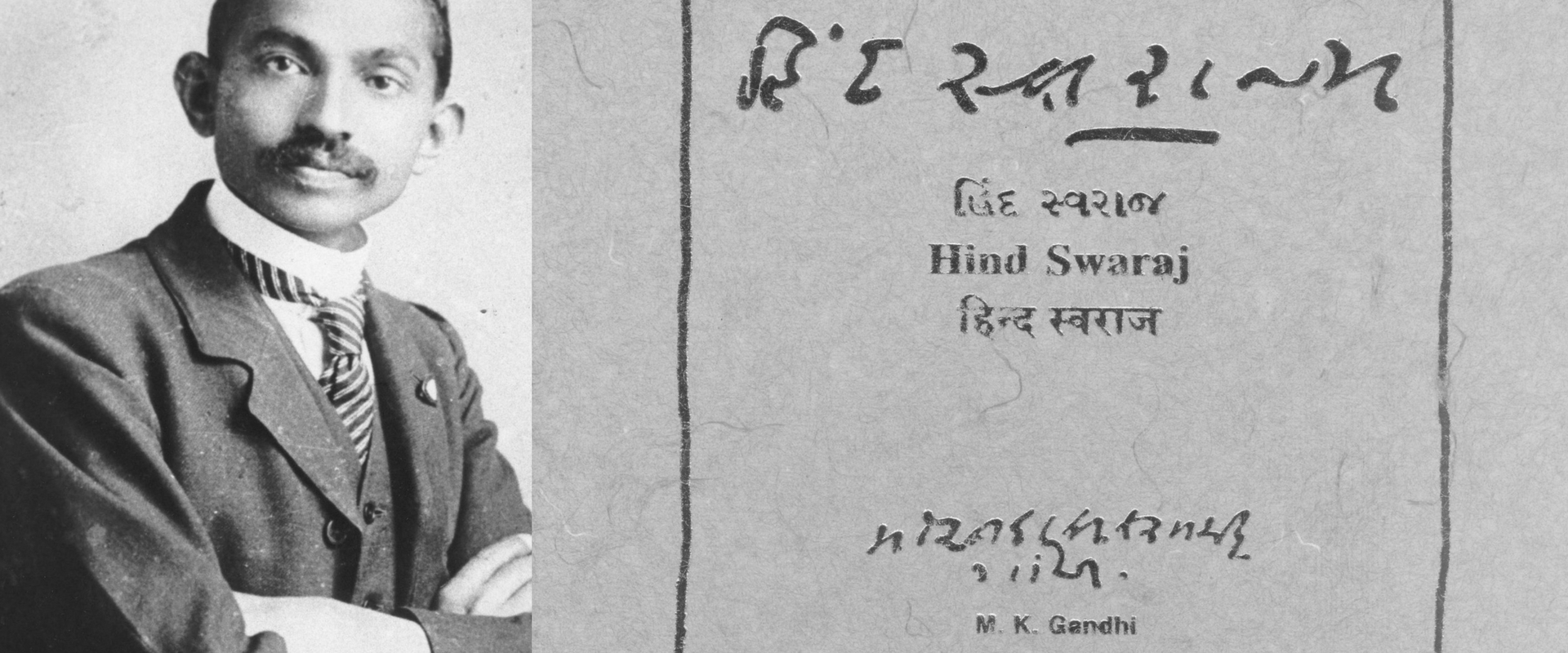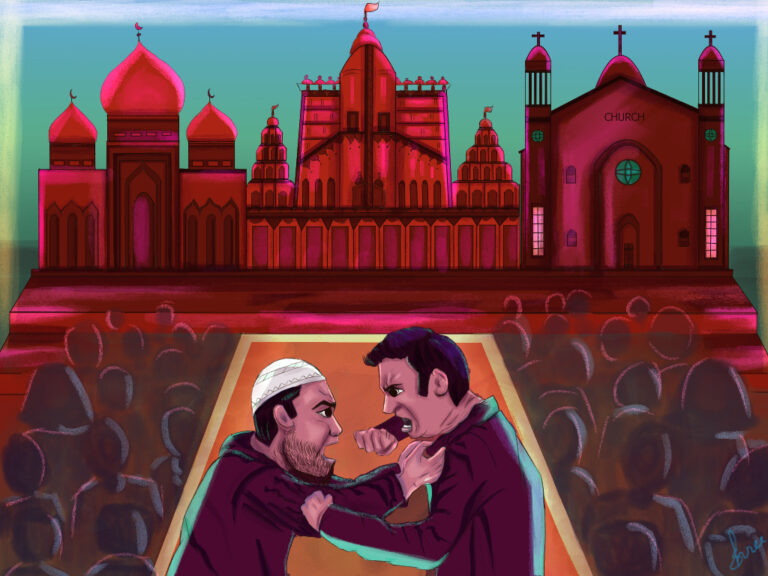Gandhi’s Hind Swaraj and Modern Western Civilisation

In 1909, Mahatma Gandhi wrote ‘Hind Swaraj’, connoting his ideas on modern civilization and Home Rule. Even after 100 years of its publication, it still manages to arouse interest in readers’ minds worldwide. It stands as a foundation to perceive Gandhi’s theories and conceptions on life. Gandhi wrote this book to make people understand the true meaning of swaraj amidst when the whole world had become captivated by the wars and conflicts. His views on the conscience of our soul acted as a stimulus for the freedom fighters battling for Indian independence.
It must be enunciated that Hind Swaraj was not composed by Mahatma Gandhi as a philosophical text. Instead, it aims to understand the delusions and misconceptions that Indian fellow citizens had about freedom emphasising ideological independence. Throughout Hind Swaraj, Gandhi has criticised each facet of western civilisation for demonstrating how abhorrent it was. He believed that the only way to overcome colonialism was by our conscience–to rise above the enemy within.
Gandhi’s views on modern civilisation were condemned across the world by many of his admirers as he sought to liberate the country from this disease. Tools of modern civilization, like machinery, technology or even the political institutions of those times, did not fit in India as envisaged by him. Like hospitals, legal systems and even parliamentary democracy, the institutions of modern civilisation propagated immorality. Some might consider this a paradox. Mahatma Gandhi used the ideals of non-violence as his tool, but he also perceived the manifestation of violence in every component of modernity. However, it is imperative to emphasise a distinction between self-analysis emerging from the deterred mentality and self-criticism that invoke practical interventions.
Gandhi was cognizant that the book’s language might be simple; still, the beliefs it captures are convoluted and intricate. He underlined the language’s limitations to convey his thoughts since the tone is sometimes bitter, misleading the reader. [1] By the term “modern civilisation”, Gandhi implied the behaviour developed from the Industrial Revolution. The Industrial Revolution for him was much more than a mere change in the mode of production. As he interprets it, it brought into being a new mode of life, embracing a people’s outlook on nature and human nature, religion, ethics, science, knowledge, technology, politics and economics.[2]In the backdrop of the Industrial Revolution, manual labour was not being appreciated enough. With the advent of mechanisation and the growth of technology, manual labour was considered something for the impoverished and the uneducated. In his regard, manual labour should be regarded as superior to other professions, and every man should earn his bread by sweat and hard work, not relying on mechanisation. [3]
The Railways were another instrument of Colonialism through which the Industrial Revolution paved its way in India. Hind Swaraj considered this and scathingly condemned it. Gandhi brutally criticised the railways, terming them as carriers of disease that has increased the frequency of famines since people sell out their grain in the wake of mobility. His views were derived by Dadabhai Naoroji and RC Dutt, a historian who had elucidated that the railways facilitated food movement in times of famine; but did not produce food. For the production of more food, irrigation was crucial. Railways without irrigation did not solve poverty and famines. Still, in a sense, it aggravated them through the fact that capital that could have been spent on irrigation was instead spent extravagantly on railways.[4]
This assault by Gandhi on the railways also represents the capability and influence humans have acquired through mechanisation. Railways, in his opinion, instigated the intermix of cultures and religions. This was in connection to the Hindu-Muslim relations that he discussed in Hind Swaraj. Though his attack might seem a little far out and exaggerated, it was true that railways played a vital role in establishing Brtish’s political control over the country.
Examining this perception of Gandhi, we must remember that Gandhi sought to establish linkages between culture and religion throughout his life. Through his words, he encourages alienation that intends to incite the readers about the profound impact modernity has on them. Railways brought a distinction between the poor and the rich and allowed the English to have a stronger hold.
Hind Swaraj makes it evident that Gandhi presumed that modern civilisation endorsed bodily comforts. Self-interest occupies an ample space in a system where comforts and luxuries are considered not only desirable but the highest achievements of civilization.
Another instance of this is when Gandhi propelled a scathing attack on the doctors in the Hind Swaraj. He criticised the hospitals and went as far as calling them the institutions that propagate sins, which was also considered one of the most extreme stands that Gandhi took in Hind Swaraj. His belief stemmed from the conception of modern medication, which was established through enmity since innocent animals are regularly inflicted with noxious and poisonous drugs for testing. [5]
Regarding modernisation and the development of hospitals and medicines, the perception of Gandhi still stands relevant. In the present time, hospitals charge exorbitant fees from the people, and their only motive remains profit. As per a study by the ‘Union Ministry of Statistics and Programme Implementation’, hospitalisation has become six times more expensive in the private sector following our independence in 1947.[6] Gandhi was an optimistic and pragmatic man, and therefore he believed that if we are in complete control of our mind, we need not indulge in pills and medicines to cure our ailment. Ancient Indian wisdom profoundly impacted his ideas, and therefore, he prioritised selfless service and not modern medicine as they were based on atheism and immorality.
Gandhi had also slammed lawyers in Hind Swaraj for advocating lawsuits and deliberately delaying them. He accused them of offering their support to the British by igniting the Hindu- Muslim quarrels to fill their own pockets. [8] Though Gandhi himself was a lawyer, he held quite an abrasive opinion about them and was not shy to express it in the most discerning manner. It is pretty unusual to see a man hating his profession so passionately, from comparing them to leeches to even proposing they work for free. Perhaps his opinions were informed by his own experiences in the legal space. According to him, the law in itself cannot heal the malicious and hateful society, only informed and knowledgeable public opinion can do that. [9]
Gandhi’s perceptions about the modern social institutions developed in India by the British Raj highlighted the egotistical, impatient and greedy facet of humankind. His assessment and criticism of the lawyers and doctors suggest that the fundamental and elementary institutions established in the backdrop of western civilisation were essentially unsustainable.
Examining this argument, it can be contended that Gandhi had two sets of peculiar beliefs. On the one hand, there is this ingenious reasoning of a lawyer and politician, whereas, on the other hand, there is visionary and utopian reasoning of a spiritual seeker. Both lines of thoughts appear in Hind Swaraj that describe the extremist viewpoint Gandhi has adopted.[10] Evaluating these viewpoints, we can infer that he was very inspired and optimistic about the Indian civilization. Still, he permitted his spiritual and ethical energy to overshadow his observation about the state of this world. Capitalism and the Industrial Revolution also greatly influenced his understanding of modern civilisation. His renunciation of capitalism and the Industrial Revolution is placed on his acute hostility towards a structure where profits and earnings authorise the degradation of manual labour and where machines are given more significance than people. The culture and the way of life of the west did not particularly affect him, as evidence suggests that he admired it. However, modernity in general bothered and frightened him because of its staggering impact on human beings across the world. Our dresses used to be shabby, our houses uncomfortable, and the food more basic during earlier times. In today’s time, the urban communities have developed at the cost of the farming population, and the outlook of these urban people towards manual labour is despicable. This is perhaps why Gandhi draws out the contrast between life before the advent of modern civilization and life after it.
Gandhi has quoted in Hind Swaraj, “Civilisation is that mode of conduct which points out to man the path of duty”. Through this definition of civilisation, Gandhi combined the notions of duty, morality and self-knowledge. He admired and glorified the villages of India and believed that the restoration of villages could only happen when it is no longer exploited by mass-scale industrialization like the cities of Bombay and Calcutta, which in his opinion, were real plague spots. [11]
Considering Gandhi’s arguments on modern civilisation, we can derive that he was caught up in his own utopian beliefs and ideas. His hostility toward modern civilisation existed as he was hopeful of his notions of civilisation which in his judgement were conceivable. However, his thoughts and notions are purely developed based on spiritual awakening and profound comprehension of our beings which is not practical in this imperfect, polarised and unequal world.
Hind Swaraj, in many aspects, disregards the countless benefits modern civilisation has offered humankind, its scientific advancements, its control over the environment and its convenience beyond measure. However, the focal point of his assessment of modern civilisation is of a particular duration; his denouncement of the British Raj centres around its imperialistic aspirations and his renunciation of industrialisation has developed from its relation to Capitalism. The book deliberates upon the concept of morality and the long-standing disputes between the oppressor and oppressed. [12]
More than 100 years after the publication of this book, people have a whole new vision about civilization and humanity that underestimates the innate colonialism within our society. Caste, gender and religious distinctions remain fundamental to India, and income inequality has been expanding rapidly ever since Independence. With improved innovations and technology, there was a belief that people would finally be exempted from tedious and demeaning work. However, what we now have is a consumerist world that encourages overproduction and discredits the dignity of labour. This was everything Gandhi stood against vehemently. He believed in social engineering, which meant the transformation of character.
In the present day, modern civilisation has progressively increased the standard of living. However, poverty still prevails across India. Gandhi’s insistence on Chakra, Khadi, and villages persuaded the people to understand the ramifications of modern civilization and the significance of Indian villages. Gandhi’s persistence made sure that people realise that there lies misery and poverty behind the glitter of cities. It is essential to acknowledge that actual progress lies not in creating millionaires or big cities but reducing the suffering of the poor peasant in villages.[13] Self-respect, self-realization and self-reliance were the three main pillars of Swaraj as per Gandhi.[14]His attempts begin to make us understand that uncontrolled and unchecked utilisation of science and technology can lead to a corrupt and unethical society, which unfortunately is the reality today. [15]
Thus, perhaps Gandhi’s vision for society was indeed futuristic. However, it is hard to imagine ‘what could have been had we gone down Gandhi’s path of Hind Swaraj. Village life would have been simpler for the whole of India, but could it indeed have been more sustainable than our reality today, especially in a global context that would have been the same? The answer to this question could only be analysed through collective imaginaries, where the grass is always greener on the other side.
REFERENCES
- Bajpai, A. (2020). Some contextual reflections on hind swaraj: a critique of ‘modernity and an argument for Indian modern consciousness. In B. Das (Ed.), Gandhian thought and communication. (pp.53-82).SAGE Publications Pv Ltd
- Gandhi, M. (2009). Gandhi: ‘Hind Swaraj’ and Other Writings (2nd ed., Cambridge Texts in Modern Politics) (A. Parel, Ed.). Cambridge: Cambridge University Press. doi:10.1017/CBO9780511807268
- Mishra, R. K. (2014, May 17). Gandhi’s View on Modern Industrialism. Your Article Library.https://www.yourarticlelibrary.com/essay/gandhis-view-on-modern-industrialism/40282.
- Gandhi, M. (2009). Gandhi: ‘Hind Swaraj’ and Other Writings (2nd ed., Cambridge Texts in Modern Politics) (A. Parel, Ed.). Cambridge: Cambridge University Press. doi:10.1017/CBO9780511807268
- Gandhi, M. (2009). Gandhi: ‘Hind Swaraj’ and Other Writings (2nd ed., Cambridge Texts in Modern Politics) (A. Parel, Ed.). Cambridge: Cambridge University Press. doi:10.1017/CBO9780511807268
- Rao, S. (n.d.). Hospitalisation is six times more expensive in the private sector: Study: Bengaluru News. The Times of India. https://timesofindia.indiatimes.com/city/bengaluru/hospitalisation-is-6-times-more-expensive-in-private-sector-study/articleshow/73052991.cms.
- Kumar, M.R. (1986) “A Critical Study of Hind Swaraj: An Essay in Philosophy of Civilization.” dspace.nehu.ac.in/bitstream/123456789/12727/1/101843.pdf.
- Gandhi, M. (2009). Gandhi: ‘Hind Swaraj’ and Other Writings (2nd ed., Cambridge Texts in Modern Politics) (A. Parel, Ed.). Cambridge: Cambridge University Press. doi:10.1017/CBO9780511807268
- Sharma, A. (2019, October 2). Mahatma Gandhi on law and lawyers: Perspective. The Leaflet.https://www.theleaflet.in/mahatma-gandhi-on-law-and-lawyers-perspective/.
- Ambler, R. (2009, March 29). Gandhi Against Modernity – by Rex Ambler. The GandhiFoundation.https://gandhifoundation.org/1997/01/05/gandhi-against-modernity-%E2%80%93-by-rex-ambler/.
- Gandhi, M. (2009). Gandhi: ‘Hind Swaraj’ and Other Writings (2nd ed., Cambridge Texts in Modern Politics) (A. Parel, Ed.). Cambridge: Cambridge University Press. doi:10.1017/CBO9780511807268
- Heredia, R. (1999). Interpreting Gandhi’s Hind Swaraj. Economic and Political Weekly, 34(24), 1497-1502. Retrieved May 17, 2021, from http://www.jstor.org/stable/4408073
- Mishra, R. K. (2014, May 17). Gandhi’s View on Modern Industrialism. Your Article Library.https://www.yourarticlelibrary.com/essay/gandhis-view-on-modern-industrialism/40282.
- Heredia, R. (1999). Interpreting Gandhi’s Hind Swaraj. Economic and Political Weekly, 34(24), 1497-1502. Retrieved May 17, 2021, from http://www.jstor.org/stable/4408073
- Kumar, M.R. (1986) “A Critical Study of Hind Swaraj: An Essay in Philosophy of Civilization.” dspace.nehu.ac.in/bitstream/123456789/12727/1/101843.pdf.








